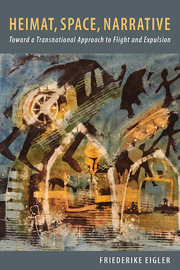Book contents
- Frontmatter
- Dedication
- Contents
- Acknowledgments
- Introduction: Geocritical Approaches to Place-Bound Belonging
- Part I Reassessing the Study of Heimat, Space, and Postwar Expulsion
- Part II Horst Bienek's Novels on Upper Silesia (1975–82)
- Part III Contemporary Novels
- Conclusion: “Lived Spaces” in Literary Narratives
- Filmography
- Works Cited
- Index
Conclusion: “Lived Spaces” in Literary Narratives
Published online by Cambridge University Press: 05 August 2014
- Frontmatter
- Dedication
- Contents
- Acknowledgments
- Introduction: Geocritical Approaches to Place-Bound Belonging
- Part I Reassessing the Study of Heimat, Space, and Postwar Expulsion
- Part II Horst Bienek's Novels on Upper Silesia (1975–82)
- Part III Contemporary Novels
- Conclusion: “Lived Spaces” in Literary Narratives
- Filmography
- Works Cited
- Index
Summary
To conclude, I will offer a few final comments on this study's overarching question regarding literary engagements with Heimat in the context of flight and expulsion and in the context of contemporary German-Polish border regions. By selecting narratives from authors of different generations who revisit the human and social effects of forced relocation in the context of the Second World War, I have focused on different literary responses to the loss of Heimat and on narrative efforts to establish new ones. Horst Bienek's tetralogy from the 1970s and early 1980s exemplifies the critical engagement with lost territories by an author of the first generation. Christoph Hein's Landnahme and Reinhard Jirgl's Die Unvollendeten represent novels that work through the “postmemories of loss” that are characteristic of post-Wende literary approaches by the second generation. Kathrin Schmidt's Gunnar-Lennefsen Expedition and Tanja Dückers's Himmelskörper, authors of the third generation, go beyond a fixation on loss and illustrate approaches that construct places of belonging via re-membering and reimagining family history. By contrast, substantive engagement with the postmemorial spaces of specific geographies of German-Polish border regions is the main focus of Olga Tokarczuk's Dom dzienny, dom nocny (Taghaus, Nachthaus) and of Sabrina Janesch's Katzenberge—the last representing the youngest generation of German writers.
- Type
- Chapter
- Information
- Heimat, Space, NarrativeToward a Transnational Approach to Flight and Expulsion, pp. 177 - 180Publisher: Boydell & BrewerPrint publication year: 2014



